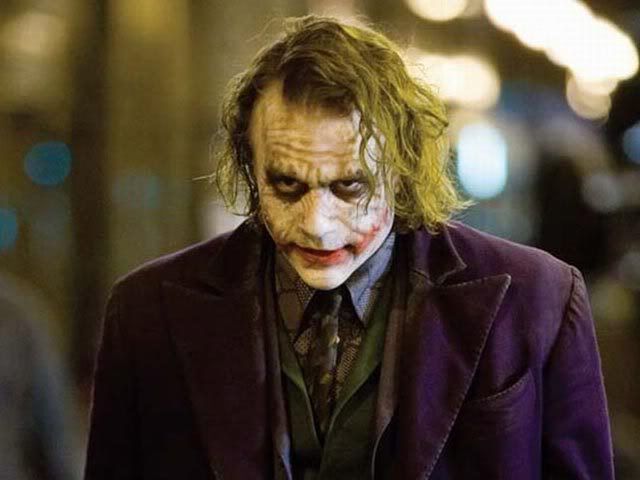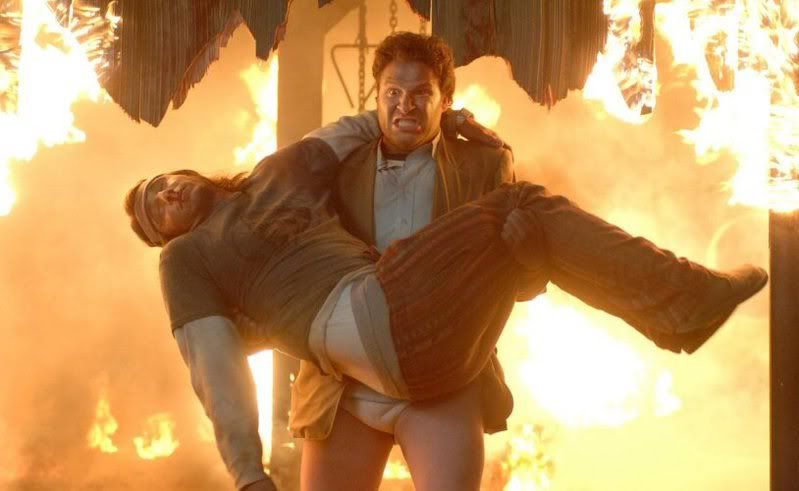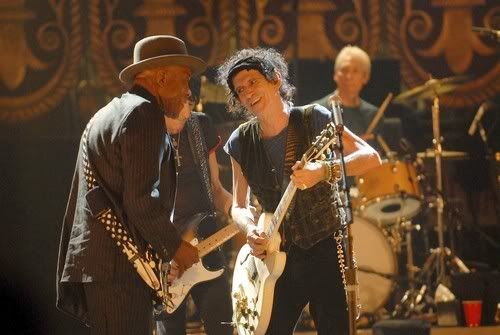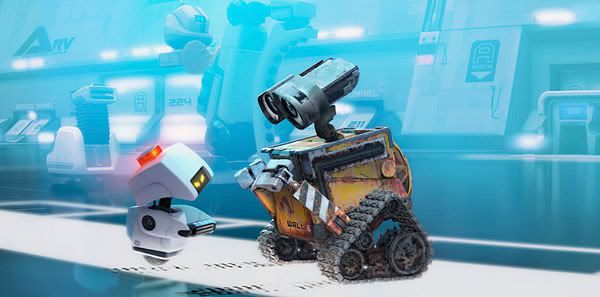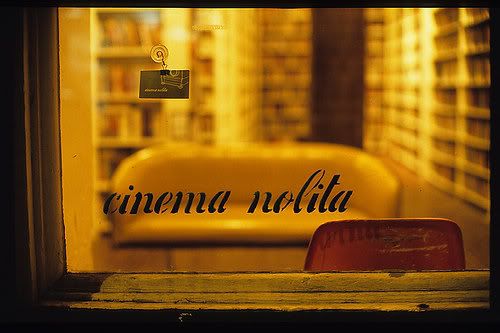Bungle in the Jungle
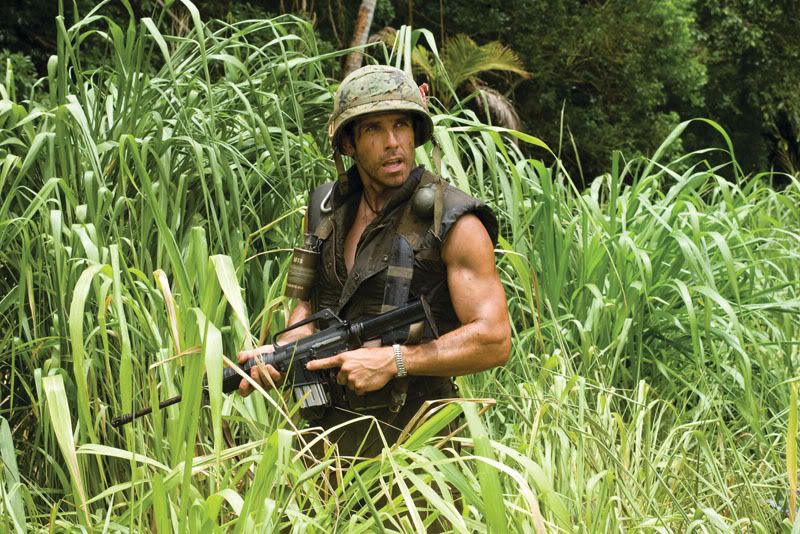
Among the motley crew are Tugg Speedman (Stiller), slightly past-his-prime action star, and Jeff Portnoy (Black), an embarrassing, heroin-addicted comic, both trying to get a stab at some critical respectability, and Kirk Lazarus, a method actor so pretentiously dedicated to his craft that he dyes his skin black in order to play the platoon's African-American seargent, refusing to come out of character "until the DVD commentary." British filmmaker Damien Cockburn (Steve Coogan,) who recalls Peter O'Toole's Eli Cross in The Stunt Man minus the fear and respect from everyone around him, is having trouble reconciling all the whiny, self-centered egos, much to the anger of fat, disgusting, foul-mouthed studio boss Les Grossman (a mind-blowingly hilarious turn by Tom Cruise.) As the picture gets further and further behind schedule, Cockburn decides, at the suggestion of Nick Nolte's loopy survivalist vet author, to drop the boys "into the shit" - rig the jungle with hidden cameras and film their reactions to surviving in the jungle. Unfortunately, the group of actors strays offtrack, into the midst of a band of very real, heavily armed, and not entirely welcoming band of drug lords.
The premise of placing dull-witted characters into a dangerous situation that they think is all just an act is a well-worn comedic plot - indeed, when Tropic Thunder's trailers came out, I feared something along the lines of the awful Bill Murray vehicle The Man Who Knew Too Little in a Platoon-style setting. But Stiller (directing here for the first time since the much-loved Zoolander) uses this formula as a vessel for one of the most bare-knuckled Hollywood satires in a good long while. Even when it becomes all but completely obvious that the the moronic, camouflage-fatigued quintet that they are not making middle of a fly-on-the-wall war picture but caught in an incredibly dangerous, life-threatening situation, they still refuse to break character, in the off-chance of being awarded an Oscar for their troubles.
Another thing that makes Tropic Thunder so enjoyable is its stars' gleeful willingness to relentlessly make fun of themselves and their peers. Taking a note from Grindhouse's book, the movie opens with a series of fake trailers: Jeff Portnoy's "The Fatties: Fart Two," an Eddie Murphy-styled fatsuits n' flatulence fiasco in which he plays every character, and "Satan's Alley," with Lazarus and Tobey McGuire as a pair of homosexual monks. Black manages to make heroin addiction hilarious through the character of Portnoy, underscoring our society's tabloid obsession with tears-of-a-clown stories. Cruise's Weinstien-esque producer is the most hateful, egotistical megalomaniac he's played since Magnolia, which, as we've learned from recent incidents of couch-jumping and other shenanigans, apparently didn't entail that much actual acting.
Most hilarious of all is Downey, whose "dude playing a dude disguised as another dude," reaches all-new hights of Brando-disciple method actorly pretension. Downey had already elicited controversy before the film was released, both for his donning of blackface and an Otis Redding-style afro, and for cautioning Stiller's character never to "go full retard" (Tuggman's in his previous endeavor is shown to have been a life-affirming weepie called "Simple Jack," about a stuttering, severely mentally handicapped farm boy who says things like "Goodnight, mama. I will see you in my head movies.") Frankly, I don't think a protest group has missed the point of a comedy this much since the churchgoing set who tore Life of Brian a new one - Tropic Thunder does not mock people of color nor the mentally handicapped, it mocks self-important twit actors who see these groups solely as fodder for the harvesting of accolades. Of course, it takes an immensely skilled (not to mention ballsy) performer to make the joke work without being inflammatory, but Downey nails it pitch-perfect.
Lensed by John Toll (who also shot The Thin Red Line) and boasting a soundtrack of worn-out-their-welcome classic rock tunes, Stiller proves himself once again to be a keen-eyed director when it comes to making a spoof that closely resembles the real thing. Every Nam-flick cliche is present and accounted for. It's somewhat ironic, then, that Stiller the actor wound up being my sole quibble with the movie. While Downey and Black perfectly play highly satirized versions of themselves, Stiller seems miscast as a beefy musclehead, reverting essentially to playing his Mr. Furious character from Mystery Men in combat boots. It's certainly not enough to spoil the whole film, and I'd rather see Stiller in this than the scores of Meet the Fockerses and Along Came Pollys. But I couldn't help thinking how much funnier someone like The Rock or Vin Diesil would have done at balancing the tough-guy persona with the comical stupidity (I'm not kidding, I think these two more than proved their respective knacks for comedy in Get Smart and Find Me Guilty.) Even Ben Affleck, who I'm still holding out hope will come back and do something as great as Dazed and Confused someday, would have been better suited than Stiller, whose strenghts lie mainly in playing neurotic, tightly-wound dweebs. Even so, it isn't enough to spoil an otherwise hilarious and surprisingly scathing satire of the well-treaded subject that is Dream Factory pomposity and horseshit. It may not be remembered alongside Sunset Boulevard and The Player, but it's still a hell of a lot better than Hollywood Ending.
